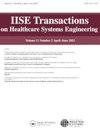个性化心脏模拟的时空建模与优化
IF 1.5
Q3 HEALTH CARE SCIENCES & SERVICES
IISE Transactions on Healthcare Systems Engineering
Pub Date : 2021-02-11
DOI:10.1080/24725579.2021.1879322
引用次数: 5
摘要
心脏的计算建模在定量理解心脏功能方面做出了巨大贡献,在帮助医生诊断心脏病方面显示出巨大的潜力。然而,心脏模拟通常在不同的个体之间具有不确定性和可变性。传统的“一刀切”模拟在为心脏病患者提供个性化的最佳诊断和治疗方面存在局限性。在临床实践中充分发挥心脏计算建模的潜力需要有效和高效的模型个性化。在本文中,我们开发了一个用于心脏模型校准的时空建模和优化框架。所提出的校准框架不仅有效地量化了仿真模型与实际心脏系统的时空差异,而且提高了心脏电生理个性化建模的计算效率。在三维心脏仿真中对模型的性能进行了验证和评价。数值实验表明,该框架在心脏模拟标定方面明显优于传统方法。本文章由计算机程序翻译,如有差异,请以英文原文为准。
Spatiotemporal modeling and optimization for personalized cardiac simulation
Abstract Computational modeling of the heart has contributed tremendously in quantitatively understanding the cardiac functions, showing great potential to assist medical doctors in heart-disease diagnosis. However, cardiac simulation is generally subject to uncertainties and variabilities among different individuals. Traditional “one-size-fits-all” simulation is limited in providing individualized optimal diagnosis and treatment for patients with heart disease. Realizing the full potential of cardiac computational modeling in clinical practice requires effective and efficient model personalization. In this paper, we develop a spatiotemporal modeling and optimization framework for cardiac model calibration. The proposed calibration framework not only effectively quantifies the spatiotemporal discrepancy between the simulation model and the physical cardiac system, but also increases the computational efficiency in personalized modeling of cardiac electrophysiology. The model performance is validated and evaluated in the 3D cardiac simulation. Numerical experiments demonstrate that the proposed framework significantly outperforms traditional approaches in calibrating the cardiac simulation.
求助全文
通过发布文献求助,成功后即可免费获取论文全文。
去求助
来源期刊

IISE Transactions on Healthcare Systems Engineering
Social Sciences-Safety Research
CiteScore
3.10
自引率
0.00%
发文量
19
期刊介绍:
IISE Transactions on Healthcare Systems Engineering aims to foster the healthcare systems community by publishing high quality papers that have a strong methodological focus and direct applicability to healthcare systems. Published quarterly, the journal supports research that explores: · Healthcare Operations Management · Medical Decision Making · Socio-Technical Systems Analysis related to healthcare · Quality Engineering · Healthcare Informatics · Healthcare Policy We are looking forward to accepting submissions that document the development and use of industrial and systems engineering tools and techniques including: · Healthcare operations research · Healthcare statistics · Healthcare information systems · Healthcare work measurement · Human factors/ergonomics applied to healthcare systems Research that explores the integration of these tools and techniques with those from other engineering and medical disciplines are also featured. We encourage the submission of clinical notes, or practice notes, to show the impact of contributions that will be published. We also encourage authors to collect an impact statement from their clinical partners to show the impact of research in the clinical practices.
 求助内容:
求助内容: 应助结果提醒方式:
应助结果提醒方式:


